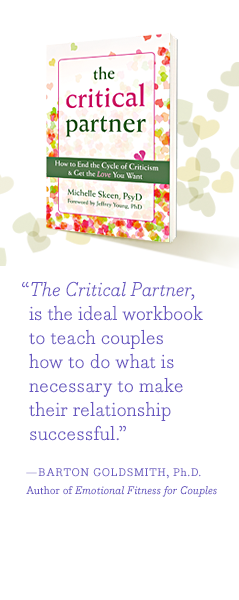Excerpts
Common Schemas of the Critical Partner
This book presents five critical partner schemas. The following descriptions are designed to assist you in identifying which profile best describes your critical partner. You may find the stories presented with each schema to be useful in recognizing familiar behaviors and interactions. The more structured assessments for identifying your critical partner’s schema are presented in chapter 2.
Critical Partner Schema: Defectiveness and Shame
The core emotion of the critical partner with a defectiveness and shame schema are shame and fear. Someone with a defectiveness and shame schema has the worldview of being bad, unwanted, inferior, or invalid in important respects, or fears possibly becoming unlovable to a partner if his true self were exposed (Young 2004). The coping behavior of people who are overcompensating for this schema is to be critical of others, act superior, or try to present as being perfect. Paradoxically, the more these people are loved, the more critical they can become to their partners.
Beth and Joe’s Story
Beth was initially attracted to Joe because he was kind, good looking, intelligent, and fun. They met in college, and Beth found him to be a refreshing alternative to the fraternity boys that she typically had dated. For Joe, Beth was the perfect package. She was beautiful, smart, and the only daughter of loving parents. At first, Joe was adoring and complimentary of Beth. She was everything that he had dreamed of in a partner. On the surface they appeared to be a good match. But Joe harbored deep shame about his family of origin. His parents had divorced when he was in first grade. Prior to the divorce, Joe’s father had begun wearing women’s clothing around the house. After moving out, Joe’s dad had a sex-change operation and lived as a woman full-time.
Meanwhile, Joe was forced to be self-sufficient at a young age. Frequently he was left at day care until 8:00 p.m. and occasionally was “forgotten.” As a teenager, Joe was kicked out of the home that he shared with his mother and younger sister (the favorite child). All of these childhood experiences made Joe feel inferior, unwanted, and unlovable. The closer that Beth and Joe became, the more vulnerable he was to his defectiveness and shame schema.
Both Beth and Joe find that he becomes critical of her after they spend time with her family and friends. Beth reports that in social situations, Joe criticizes everyone. He responds that he is joking, but his jokes have a hard edge that leaves everyone feeling uncomfortable. The discomfort others experience around Joe have Beth’s family and friends questioning why Beth is with him. Although Beth loves Joe and knows that he is a good person, she feels that his behavior needs to change or she might eventually have to let go.

